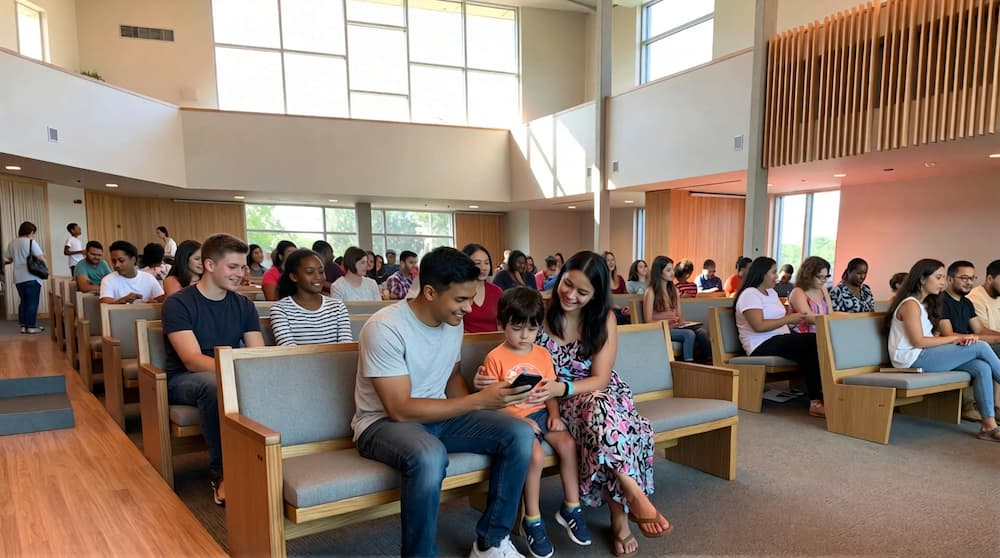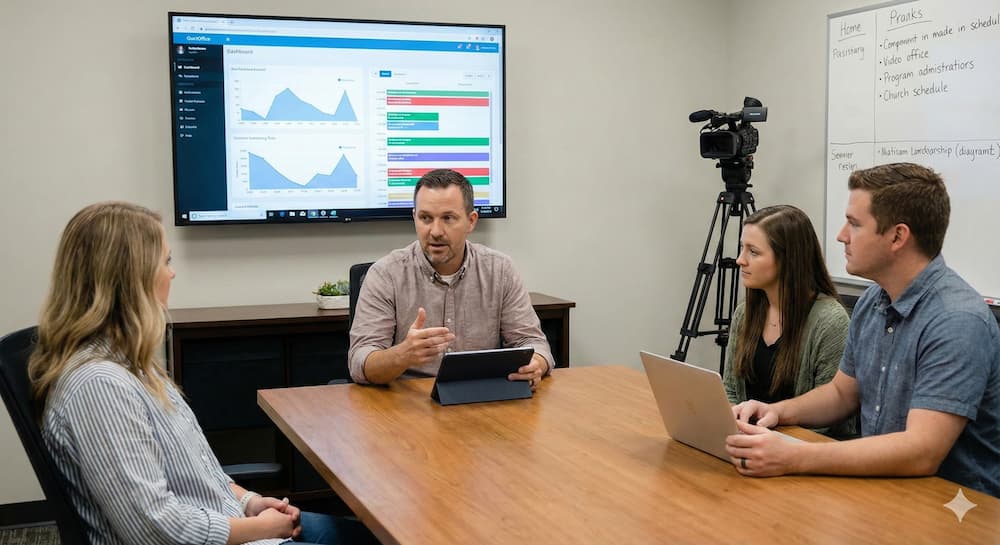Church SEO: 6 Keys to Reach More People with Your Website
Here are six essential strategies to optimize your church’s website and expand its reach. Each tactic is equally vital, so be sure to implement all of them if you haven’t done so already.

Your church’s website is the new front door.
Most people searching for a new church will search online first.
According to Grey Matters, more than 17 million adults who do not regularly attend a worship service searched for a church online.
In your community, right now, there’s a good chance someone is searching for a church.
They are in need of hearing the gospel.
They are craving Christian community.
They have an interest in raising their children in church.
To help visitors find your church, you’ll need to fling wide open your church’s (digital) door.
To do this, you’ll need to focus on what’s called search engine optimization (SEO).
In this post, I’m going to walk you through six keys to boost your church’s SEO:
- Claim your local listings
- Encourage reviews
- Find the keywords people are using
- Optimize your site with keywords
- Embed a Google Map
- Include your address—everywhere
Here are six keys to optimizing your church’s website, which will help you to reach more people with your church’s website. These tactics are equally important, so plan on taking action on everything listed below if you haven’t already.
Claim your local listings
A critical step you must take in church SEO is to claim your church’s local listing.
There are several factors that influence your church’s local SEO. But if you skip this step, you might as well not worry about reading the rest of this post. Claiming your local listing is that important.
To help you get started, here are the three listings you want to snag first:
Claiming your church’s local listing will provide you with three HUGE benefits.
First, claiming your listing will let search engines know how to display your information in search results. This will help people searching for local churches in your area to know about your church, such as your address, hours, and contact information.
Second, local listings will provide your church with a local citation (information about your church), which is an important component to ranking in local church search results.
Third, claiming your local listing will prominently display your church in certain results.
Here’s a search example from a desktop of Crossridge Church:

Let me warn you:
This isn’t necessarily an easy step. It will take time to work through this process. If you’re stretched for time or don’t have someone on your church staff who can help, consider outsourcing this to a volunteer or a professional to make sure this gets done.
Encourage reviews
Reviews can increase your church’s local ranking and provide legit social proof.
Think about it like this:
Positive reviews play a big part in influencing whether or not you’ll make a purchase. If you see a litany of bad reviews, then there’s a good chance you won’t buy the latest gadget you’re eyeing or bite into a steak at the local steakhouse.
The same holds true for your church.
What is more, reviews also play a big part in influencing local searches. It’s one-way search engines know that your church (listing) is active.
Don’t have any online reviews?
No sweat.
Here’s how you can get the ball rolling:
At first, ask volunteers and other people you know in your church to leave a review.
This tactic might make you feel uncomfortable. But there’s nothing wrong with asking people you know to leave a positive review.
All you need to do is send an email, ask them face-to-face, or make a phone call to encourage people to leave a review.
After you take this step, an additional idea you can consider is to place a sign on at your welcome center or one in a window encouraging people to leave a review.
Find the keywords people are using
Take a moment to place yourself in the shoes of someone searching for a church.
In a search engine, what words will they use?
What questions will they ask?
What phrases come to mind?
Whatever word or phrase comes to mind is what you call a keyword. It’s what you type into a search engine to find whatever you’re looking for.
Thankfully, you don’t have to guess at what people are using.
There are a few ways you can find out the most popular phrases in your community.
Google Analytics
Do you have Google Analytics set up on your church’s website?
If so, you can get a really good idea of how people are finding your site.
For example, you can see:
- What keywords people use to find your website
- What websites refer people to your church’s site
- What social media channels leading people to visit your website
- And more...
I’ll admit:
Google does hide a lot of the keywords people use to find your church’s site. But you can use a service like Ahrefs or SEMRush to learn more. Both of these services offer a free trial you can use to find what you’re looking for.
Google Trends
Google Trends is a powerful, free tool that can elevate your keyword research and help your local church reach more people online. By analyzing the popularity of specific keywords over time, you can identify trending topics, compare search terms, and discover seasonal patterns that influence search behavior in your area. For example, searching for terms like “churches near me,” “family-friendly church services,” or “holiday worship services” can reveal how these phrases are performing locally. You can also filter results by location to find keywords that resonate with your community. Additionally, the platform's "related queries" and "rising searches" features can uncover new keyword ideas, such as specific ministries or outreach programs people are searching for in your region. By aligning your website content, blog posts, or event pages with what your local audience is actively looking for, you can boost your visibility in search results and connect with more people in your community.

Focus your keyword phrase
Do you have a list of keyword phrases on hand?
Great!
Now it’s time to focus your efforts.
With your list of keyword phrases in hand, identify the keyword you want to focus on--e.g., “pentecostal church in Ithaca New York.”
Keep this keyword phrase in hand.
You’ll need it to complete the next task.
Optimize your site with keywords
Now it’s time to optimize your website with your keyword phrase.
From your homepage to the individual pages of your website, it’s important to optimize every single page. Here are several important onsite search engine optimization (SEO) to update:
- Title Tags
- Meta Description
- Page URL
- Body copy
- Alt-text in images
What is more, for the content on your individual pages, include your keyword phrase in H1 tags.
I understand this can feel overwhelming.
If you’re working with a shoestring budget or don’t have a volunteer who can help, there’s a tool you can use to help you optimize your site.
If you use Wordpress for your church’s content management system (CMS), then consider using these two plugins to help you optimize your individual pages:
Embed a Google Map
Embed a Google Map with a marker of your local church.
The best place to include this is on your Contact Page. To do this, all you need to do is search for your church in Google Maps, click SHARE, copy the code from Embed map, and paste it into your Contact Page.
Like this:
Include your address—everywhere
You’ll need to include your physical address all over your site.
Not a picture.
Not a map.
Not an image.
But the copy (words) of your physical address.
For this tactic, it’s important to use the same information and format as you do on local listings and local directories. For example, you don’t want to use an abbreviation like “blvd” or “rd” in one place and “boulevard” or “road” in another place.
Before you start copying and pasting your address, here’s one easy way you can accomplish this task: Add your physical address in the footer of your church’s website. This way it will appear at the bottom of every page.
Here’s an example from Rock Church:

Help people find your church
Your church’s website can be a great evangelistic tool.
It’s one way you can digitally connect with people to lead them to meet you in person by visiting your worship service or to learn more about your church.
Connect with more people in your community online, lead them to your church gathering, and point them to faith in Jesus Christ by improving your church’s SEO.
Sign Up for Product Updates
Your church’s website is the new front door.
Most people searching for a new church will search online first.
According to Grey Matters, more than 17 million adults who do not regularly attend a worship service searched for a church online.
In your community, right now, there’s a good chance someone is searching for a church.
They are in need of hearing the gospel.
They are craving Christian community.
They have an interest in raising their children in church.
To help visitors find your church, you’ll need to fling wide open your church’s (digital) door.
To do this, you’ll need to focus on what’s called search engine optimization (SEO).
In this post, I’m going to walk you through six keys to boost your church’s SEO:
- Claim your local listings
- Encourage reviews
- Find the keywords people are using
- Optimize your site with keywords
- Embed a Google Map
- Include your address—everywhere
Here are six keys to optimizing your church’s website, which will help you to reach more people with your church’s website. These tactics are equally important, so plan on taking action on everything listed below if you haven’t already.
Claim your local listings
A critical step you must take in church SEO is to claim your church’s local listing.
There are several factors that influence your church’s local SEO. But if you skip this step, you might as well not worry about reading the rest of this post. Claiming your local listing is that important.
To help you get started, here are the three listings you want to snag first:
Claiming your church’s local listing will provide you with three HUGE benefits.
First, claiming your listing will let search engines know how to display your information in search results. This will help people searching for local churches in your area to know about your church, such as your address, hours, and contact information.
Second, local listings will provide your church with a local citation (information about your church), which is an important component to ranking in local church search results.
Third, claiming your local listing will prominently display your church in certain results.
Here’s a search example from a desktop of Crossridge Church:

Let me warn you:
This isn’t necessarily an easy step. It will take time to work through this process. If you’re stretched for time or don’t have someone on your church staff who can help, consider outsourcing this to a volunteer or a professional to make sure this gets done.
Encourage reviews
Reviews can increase your church’s local ranking and provide legit social proof.
Think about it like this:
Positive reviews play a big part in influencing whether or not you’ll make a purchase. If you see a litany of bad reviews, then there’s a good chance you won’t buy the latest gadget you’re eyeing or bite into a steak at the local steakhouse.
The same holds true for your church.
What is more, reviews also play a big part in influencing local searches. It’s one-way search engines know that your church (listing) is active.
Don’t have any online reviews?
No sweat.
Here’s how you can get the ball rolling:
At first, ask volunteers and other people you know in your church to leave a review.
This tactic might make you feel uncomfortable. But there’s nothing wrong with asking people you know to leave a positive review.
All you need to do is send an email, ask them face-to-face, or make a phone call to encourage people to leave a review.
After you take this step, an additional idea you can consider is to place a sign on at your welcome center or one in a window encouraging people to leave a review.
Find the keywords people are using
Take a moment to place yourself in the shoes of someone searching for a church.
In a search engine, what words will they use?
What questions will they ask?
What phrases come to mind?
Whatever word or phrase comes to mind is what you call a keyword. It’s what you type into a search engine to find whatever you’re looking for.
Thankfully, you don’t have to guess at what people are using.
There are a few ways you can find out the most popular phrases in your community.
Google Analytics
Do you have Google Analytics set up on your church’s website?
If so, you can get a really good idea of how people are finding your site.
For example, you can see:
- What keywords people use to find your website
- What websites refer people to your church’s site
- What social media channels leading people to visit your website
- And more...
I’ll admit:
Google does hide a lot of the keywords people use to find your church’s site. But you can use a service like Ahrefs or SEMRush to learn more. Both of these services offer a free trial you can use to find what you’re looking for.
Google Trends
Google Trends is a powerful, free tool that can elevate your keyword research and help your local church reach more people online. By analyzing the popularity of specific keywords over time, you can identify trending topics, compare search terms, and discover seasonal patterns that influence search behavior in your area. For example, searching for terms like “churches near me,” “family-friendly church services,” or “holiday worship services” can reveal how these phrases are performing locally. You can also filter results by location to find keywords that resonate with your community. Additionally, the platform's "related queries" and "rising searches" features can uncover new keyword ideas, such as specific ministries or outreach programs people are searching for in your region. By aligning your website content, blog posts, or event pages with what your local audience is actively looking for, you can boost your visibility in search results and connect with more people in your community.

Focus your keyword phrase
Do you have a list of keyword phrases on hand?
Great!
Now it’s time to focus your efforts.
With your list of keyword phrases in hand, identify the keyword you want to focus on--e.g., “pentecostal church in Ithaca New York.”
Keep this keyword phrase in hand.
You’ll need it to complete the next task.
Optimize your site with keywords
Now it’s time to optimize your website with your keyword phrase.
From your homepage to the individual pages of your website, it’s important to optimize every single page. Here are several important onsite search engine optimization (SEO) to update:
- Title Tags
- Meta Description
- Page URL
- Body copy
- Alt-text in images
What is more, for the content on your individual pages, include your keyword phrase in H1 tags.
I understand this can feel overwhelming.
If you’re working with a shoestring budget or don’t have a volunteer who can help, there’s a tool you can use to help you optimize your site.
If you use Wordpress for your church’s content management system (CMS), then consider using these two plugins to help you optimize your individual pages:
Embed a Google Map
Embed a Google Map with a marker of your local church.
The best place to include this is on your Contact Page. To do this, all you need to do is search for your church in Google Maps, click SHARE, copy the code from Embed map, and paste it into your Contact Page.
Like this:
Include your address—everywhere
You’ll need to include your physical address all over your site.
Not a picture.
Not a map.
Not an image.
But the copy (words) of your physical address.
For this tactic, it’s important to use the same information and format as you do on local listings and local directories. For example, you don’t want to use an abbreviation like “blvd” or “rd” in one place and “boulevard” or “road” in another place.
Before you start copying and pasting your address, here’s one easy way you can accomplish this task: Add your physical address in the footer of your church’s website. This way it will appear at the bottom of every page.
Here’s an example from Rock Church:

Help people find your church
Your church’s website can be a great evangelistic tool.
It’s one way you can digitally connect with people to lead them to meet you in person by visiting your worship service or to learn more about your church.
Connect with more people in your community online, lead them to your church gathering, and point them to faith in Jesus Christ by improving your church’s SEO.
podcast transcript
Your church’s website is the new front door.
Most people searching for a new church will search online first.
According to Grey Matters, more than 17 million adults who do not regularly attend a worship service searched for a church online.
In your community, right now, there’s a good chance someone is searching for a church.
They are in need of hearing the gospel.
They are craving Christian community.
They have an interest in raising their children in church.
To help visitors find your church, you’ll need to fling wide open your church’s (digital) door.
To do this, you’ll need to focus on what’s called search engine optimization (SEO).
In this post, I’m going to walk you through six keys to boost your church’s SEO:
- Claim your local listings
- Encourage reviews
- Find the keywords people are using
- Optimize your site with keywords
- Embed a Google Map
- Include your address—everywhere
Here are six keys to optimizing your church’s website, which will help you to reach more people with your church’s website. These tactics are equally important, so plan on taking action on everything listed below if you haven’t already.
Claim your local listings
A critical step you must take in church SEO is to claim your church’s local listing.
There are several factors that influence your church’s local SEO. But if you skip this step, you might as well not worry about reading the rest of this post. Claiming your local listing is that important.
To help you get started, here are the three listings you want to snag first:
Claiming your church’s local listing will provide you with three HUGE benefits.
First, claiming your listing will let search engines know how to display your information in search results. This will help people searching for local churches in your area to know about your church, such as your address, hours, and contact information.
Second, local listings will provide your church with a local citation (information about your church), which is an important component to ranking in local church search results.
Third, claiming your local listing will prominently display your church in certain results.
Here’s a search example from a desktop of Crossridge Church:

Let me warn you:
This isn’t necessarily an easy step. It will take time to work through this process. If you’re stretched for time or don’t have someone on your church staff who can help, consider outsourcing this to a volunteer or a professional to make sure this gets done.
Encourage reviews
Reviews can increase your church’s local ranking and provide legit social proof.
Think about it like this:
Positive reviews play a big part in influencing whether or not you’ll make a purchase. If you see a litany of bad reviews, then there’s a good chance you won’t buy the latest gadget you’re eyeing or bite into a steak at the local steakhouse.
The same holds true for your church.
What is more, reviews also play a big part in influencing local searches. It’s one-way search engines know that your church (listing) is active.
Don’t have any online reviews?
No sweat.
Here’s how you can get the ball rolling:
At first, ask volunteers and other people you know in your church to leave a review.
This tactic might make you feel uncomfortable. But there’s nothing wrong with asking people you know to leave a positive review.
All you need to do is send an email, ask them face-to-face, or make a phone call to encourage people to leave a review.
After you take this step, an additional idea you can consider is to place a sign on at your welcome center or one in a window encouraging people to leave a review.
Find the keywords people are using
Take a moment to place yourself in the shoes of someone searching for a church.
In a search engine, what words will they use?
What questions will they ask?
What phrases come to mind?
Whatever word or phrase comes to mind is what you call a keyword. It’s what you type into a search engine to find whatever you’re looking for.
Thankfully, you don’t have to guess at what people are using.
There are a few ways you can find out the most popular phrases in your community.
Google Analytics
Do you have Google Analytics set up on your church’s website?
If so, you can get a really good idea of how people are finding your site.
For example, you can see:
- What keywords people use to find your website
- What websites refer people to your church’s site
- What social media channels leading people to visit your website
- And more...
I’ll admit:
Google does hide a lot of the keywords people use to find your church’s site. But you can use a service like Ahrefs or SEMRush to learn more. Both of these services offer a free trial you can use to find what you’re looking for.
Google Trends
Google Trends is a powerful, free tool that can elevate your keyword research and help your local church reach more people online. By analyzing the popularity of specific keywords over time, you can identify trending topics, compare search terms, and discover seasonal patterns that influence search behavior in your area. For example, searching for terms like “churches near me,” “family-friendly church services,” or “holiday worship services” can reveal how these phrases are performing locally. You can also filter results by location to find keywords that resonate with your community. Additionally, the platform's "related queries" and "rising searches" features can uncover new keyword ideas, such as specific ministries or outreach programs people are searching for in your region. By aligning your website content, blog posts, or event pages with what your local audience is actively looking for, you can boost your visibility in search results and connect with more people in your community.

Focus your keyword phrase
Do you have a list of keyword phrases on hand?
Great!
Now it’s time to focus your efforts.
With your list of keyword phrases in hand, identify the keyword you want to focus on--e.g., “pentecostal church in Ithaca New York.”
Keep this keyword phrase in hand.
You’ll need it to complete the next task.
Optimize your site with keywords
Now it’s time to optimize your website with your keyword phrase.
From your homepage to the individual pages of your website, it’s important to optimize every single page. Here are several important onsite search engine optimization (SEO) to update:
- Title Tags
- Meta Description
- Page URL
- Body copy
- Alt-text in images
What is more, for the content on your individual pages, include your keyword phrase in H1 tags.
I understand this can feel overwhelming.
If you’re working with a shoestring budget or don’t have a volunteer who can help, there’s a tool you can use to help you optimize your site.
If you use Wordpress for your church’s content management system (CMS), then consider using these two plugins to help you optimize your individual pages:
Embed a Google Map
Embed a Google Map with a marker of your local church.
The best place to include this is on your Contact Page. To do this, all you need to do is search for your church in Google Maps, click SHARE, copy the code from Embed map, and paste it into your Contact Page.
Like this:
Include your address—everywhere
You’ll need to include your physical address all over your site.
Not a picture.
Not a map.
Not an image.
But the copy (words) of your physical address.
For this tactic, it’s important to use the same information and format as you do on local listings and local directories. For example, you don’t want to use an abbreviation like “blvd” or “rd” in one place and “boulevard” or “road” in another place.
Before you start copying and pasting your address, here’s one easy way you can accomplish this task: Add your physical address in the footer of your church’s website. This way it will appear at the bottom of every page.
Here’s an example from Rock Church:

Help people find your church
Your church’s website can be a great evangelistic tool.
It’s one way you can digitally connect with people to lead them to meet you in person by visiting your worship service or to learn more about your church.
Connect with more people in your community online, lead them to your church gathering, and point them to faith in Jesus Christ by improving your church’s SEO.
VIDEO transcript
Your church’s website is the new front door.
Most people searching for a new church will search online first.
According to Grey Matters, more than 17 million adults who do not regularly attend a worship service searched for a church online.
In your community, right now, there’s a good chance someone is searching for a church.
They are in need of hearing the gospel.
They are craving Christian community.
They have an interest in raising their children in church.
To help visitors find your church, you’ll need to fling wide open your church’s (digital) door.
To do this, you’ll need to focus on what’s called search engine optimization (SEO).
In this post, I’m going to walk you through six keys to boost your church’s SEO:
- Claim your local listings
- Encourage reviews
- Find the keywords people are using
- Optimize your site with keywords
- Embed a Google Map
- Include your address—everywhere
Here are six keys to optimizing your church’s website, which will help you to reach more people with your church’s website. These tactics are equally important, so plan on taking action on everything listed below if you haven’t already.
Claim your local listings
A critical step you must take in church SEO is to claim your church’s local listing.
There are several factors that influence your church’s local SEO. But if you skip this step, you might as well not worry about reading the rest of this post. Claiming your local listing is that important.
To help you get started, here are the three listings you want to snag first:
Claiming your church’s local listing will provide you with three HUGE benefits.
First, claiming your listing will let search engines know how to display your information in search results. This will help people searching for local churches in your area to know about your church, such as your address, hours, and contact information.
Second, local listings will provide your church with a local citation (information about your church), which is an important component to ranking in local church search results.
Third, claiming your local listing will prominently display your church in certain results.
Here’s a search example from a desktop of Crossridge Church:

Let me warn you:
This isn’t necessarily an easy step. It will take time to work through this process. If you’re stretched for time or don’t have someone on your church staff who can help, consider outsourcing this to a volunteer or a professional to make sure this gets done.
Encourage reviews
Reviews can increase your church’s local ranking and provide legit social proof.
Think about it like this:
Positive reviews play a big part in influencing whether or not you’ll make a purchase. If you see a litany of bad reviews, then there’s a good chance you won’t buy the latest gadget you’re eyeing or bite into a steak at the local steakhouse.
The same holds true for your church.
What is more, reviews also play a big part in influencing local searches. It’s one-way search engines know that your church (listing) is active.
Don’t have any online reviews?
No sweat.
Here’s how you can get the ball rolling:
At first, ask volunteers and other people you know in your church to leave a review.
This tactic might make you feel uncomfortable. But there’s nothing wrong with asking people you know to leave a positive review.
All you need to do is send an email, ask them face-to-face, or make a phone call to encourage people to leave a review.
After you take this step, an additional idea you can consider is to place a sign on at your welcome center or one in a window encouraging people to leave a review.
Find the keywords people are using
Take a moment to place yourself in the shoes of someone searching for a church.
In a search engine, what words will they use?
What questions will they ask?
What phrases come to mind?
Whatever word or phrase comes to mind is what you call a keyword. It’s what you type into a search engine to find whatever you’re looking for.
Thankfully, you don’t have to guess at what people are using.
There are a few ways you can find out the most popular phrases in your community.
Google Analytics
Do you have Google Analytics set up on your church’s website?
If so, you can get a really good idea of how people are finding your site.
For example, you can see:
- What keywords people use to find your website
- What websites refer people to your church’s site
- What social media channels leading people to visit your website
- And more...
I’ll admit:
Google does hide a lot of the keywords people use to find your church’s site. But you can use a service like Ahrefs or SEMRush to learn more. Both of these services offer a free trial you can use to find what you’re looking for.
Google Trends
Google Trends is a powerful, free tool that can elevate your keyword research and help your local church reach more people online. By analyzing the popularity of specific keywords over time, you can identify trending topics, compare search terms, and discover seasonal patterns that influence search behavior in your area. For example, searching for terms like “churches near me,” “family-friendly church services,” or “holiday worship services” can reveal how these phrases are performing locally. You can also filter results by location to find keywords that resonate with your community. Additionally, the platform's "related queries" and "rising searches" features can uncover new keyword ideas, such as specific ministries or outreach programs people are searching for in your region. By aligning your website content, blog posts, or event pages with what your local audience is actively looking for, you can boost your visibility in search results and connect with more people in your community.

Focus your keyword phrase
Do you have a list of keyword phrases on hand?
Great!
Now it’s time to focus your efforts.
With your list of keyword phrases in hand, identify the keyword you want to focus on--e.g., “pentecostal church in Ithaca New York.”
Keep this keyword phrase in hand.
You’ll need it to complete the next task.
Optimize your site with keywords
Now it’s time to optimize your website with your keyword phrase.
From your homepage to the individual pages of your website, it’s important to optimize every single page. Here are several important onsite search engine optimization (SEO) to update:
- Title Tags
- Meta Description
- Page URL
- Body copy
- Alt-text in images
What is more, for the content on your individual pages, include your keyword phrase in H1 tags.
I understand this can feel overwhelming.
If you’re working with a shoestring budget or don’t have a volunteer who can help, there’s a tool you can use to help you optimize your site.
If you use Wordpress for your church’s content management system (CMS), then consider using these two plugins to help you optimize your individual pages:
Embed a Google Map
Embed a Google Map with a marker of your local church.
The best place to include this is on your Contact Page. To do this, all you need to do is search for your church in Google Maps, click SHARE, copy the code from Embed map, and paste it into your Contact Page.
Like this:
Include your address—everywhere
You’ll need to include your physical address all over your site.
Not a picture.
Not a map.
Not an image.
But the copy (words) of your physical address.
For this tactic, it’s important to use the same information and format as you do on local listings and local directories. For example, you don’t want to use an abbreviation like “blvd” or “rd” in one place and “boulevard” or “road” in another place.
Before you start copying and pasting your address, here’s one easy way you can accomplish this task: Add your physical address in the footer of your church’s website. This way it will appear at the bottom of every page.
Here’s an example from Rock Church:

Help people find your church
Your church’s website can be a great evangelistic tool.
It’s one way you can digitally connect with people to lead them to meet you in person by visiting your worship service or to learn more about your church.
Connect with more people in your community online, lead them to your church gathering, and point them to faith in Jesus Christ by improving your church’s SEO.



























